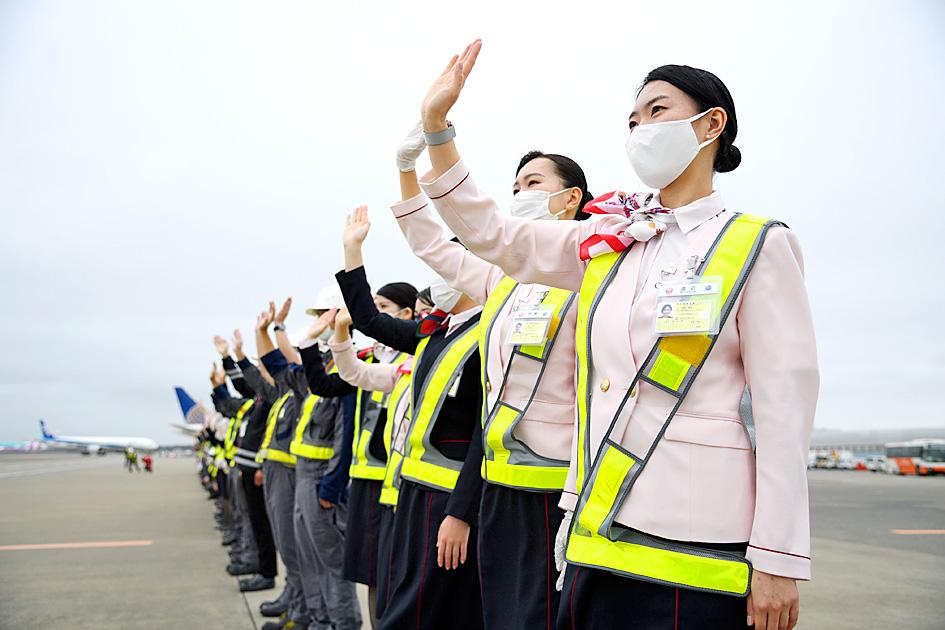Japan Airlines Co is ditching the phrase “ladies and gentlemen” and instead embracing gender-neutral terms during in-flight and airport announcements from next month, the company said yesterday.
From Thursday, the airline would “abolish expressions” based on two types of sex and “use gender-friendly” expressions like “good morning” and “good evening,” an airline spokesperson said.
In Japanese, the expression generally used for such announcements is already gender-neutral, but the decision applies to other languages used by the airline.

Photo: Bloomberg
The decision appears to be a first for major Japanese carriers, with a spokeswoman for rival ANA Holdings Inc saying that they would “study the issue based on comments from our customers.”
Same-sex marriage is not legally recognized in Japan, but the government has gradually expanded rights protections for lesbian, gay, bisexual and transgender citizens in the past few years.
Japan Airlines last year operated a trial “LGBT Ally Charter” flight for same-sex partners and their families, and has already changed rules to extend spouse and family allowances to same-sex partners.
Although Japan is relatively tolerant of homosexuality, there are no specific legal protections for gay people.
Japan’s LGBTQ population has campaigned for greater recognition from the government in the past few years.
Thirteen same-sex couples last year filed suits accusing Tokyo of discrimination for failing to recognize their unions.
They argue that they are being denied rights accorded to heterosexual couples and hope courts will declare the government’s position unconstitutional.

Among the rows of vibrators, rubber torsos and leather harnesses at a Chinese sex toys exhibition in Shanghai this weekend, the beginnings of an artificial intelligence (AI)-driven shift in the industry quietly pulsed. China manufactures about 70 percent of the world’s sex toys, most of it the “hardware” on display at the fair — whether that be technicolor tentacled dildos or hyper-realistic personalized silicone dolls. Yet smart toys have been rising in popularity for some time. Many major European and US brands already offer tech-enhanced products that can enable long-distance love, monitor well-being and even bring people one step closer to

Malaysia’s leader yesterday announced plans to build a massive semiconductor design park, aiming to boost the Southeast Asian nation’s role in the global chip industry. A prominent player in the semiconductor industry for decades, Malaysia accounts for an estimated 13 percent of global back-end manufacturing, according to German tech giant Bosch. Now it wants to go beyond production and emerge as a chip design powerhouse too, Malaysian Prime Minister Anwar Ibrahim said. “I am pleased to announce the largest IC (integrated circuit) Design Park in Southeast Asia, that will house world-class anchor tenants and collaborate with global companies such as Arm [Holdings PLC],”

TRANSFORMATION: Taiwan is now home to the largest Google hardware research and development center outside of the US, thanks to the nation’s economic policies President Tsai Ing-wen (蔡英文) yesterday attended an event marking the opening of Google’s second hardware research and development (R&D) office in Taiwan, which was held at New Taipei City’s Banciao District (板橋). This signals Taiwan’s transformation into the world’s largest Google hardware research and development center outside of the US, validating the nation’s economic policy in the past eight years, she said. The “five plus two” innovative industries policy, “six core strategic industries” initiative and infrastructure projects have grown the national industry and established resilient supply chains that withstood the COVID-19 pandemic, Tsai said. Taiwan has improved investment conditions of the domestic economy

MAJOR BENEFICIARY: The company benefits from TSMC’s advanced packaging scarcity, given robust demand for Nvidia AI chips, analysts said ASE Technology Holding Co (ASE, 日月光投控), the world’s biggest chip packaging and testing service provider, yesterday said it is raising its equipment capital expenditure budget by 10 percent this year to expand leading-edge and advanced packing and testing capacity amid strong artificial intelligence (AI) and high-performance computing chip demand. This is on top of the 40 to 50 percent annual increase in its capital spending budget to more than the US$1.7 billion to announced in February. About half of the equipment capital expenditure would be spent on leading-edge and advanced packaging and testing technology, the company said. ASE is considered by analysts